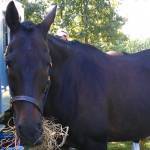Have Horse, Will Travel Safely

Competitive horses travel extensively during their careers. Consider, for example, the miles traveled by horses involved in Fédération Equestre Internationale events held throughout the world. Transport is not restricted to the elite, as horses of all skill sets must travel to participate in competitions and activities. While transport of horses is an everyday occurrence, welfare concerns may arise if horses become stressed during transit. As stress intensifies, health and behavioral issues could ensue.
“Recognizing our role in compromising equine welfare during transport must be paramount to decrease the incidence of injury, disease, and biosecurity issues,” said Catherine Whitehouse, M.S., a Kentucky Equine Research advisor.
Injuries commonly occur during transport. Some are obvious such as head or leg wounds, but others are less noticeable, like deep bruising of muscles and other tissues. Further, injuries during loading and, less frequently, unloading contribute to stress. In one survey, 4% of horses injured while loading, transit, or unloading required humane euthanasia.
Aside from injuries, respiratory disease, especially pneumonia, poses another major concern. Continually monitoring a horse’s temperature on arrival and for a couple of days afterward could identify horses with subclinical pneumonia. Prompt treatment may diminish the severity of disease.
“Studies also show that stress due to transport may also cause shedding of equine herpesviruses, a highly contagious respiratory infection that can result in quarantine restrictions at competitive events,” Whitehouse shared.
Imagine traveling all those hours and miles only to open the trailer door and be met with an injured or otherwise unhealthy horse? Take the time to train your horses to load and unload safely, stop frequently to assess their health, nourish them appropriately on long trips, and avoid mixing with other horses as much as possible both during and following transport to minimize biosecurity issues.
Strategic supplementation comes into play when managing the nutrition of finicky travelers. For those horses prone to worry, an antiulcer supplement might be warranted. Begin the supplement a couple days prior to departure and feed throughout the entire trip.
In addition, consider offering high-quality omega-3 fatty acids, such as EO-3, to the diet. The natural anti-inflammatory effects provide proven benefits to respiratory health, according to Whitehouse.
*Padalino, B., and C.B. Riley. 2020. Editorial: The implications of transport practices for horse healthy and welfare. Frontiers in Veterinary Science 7:202.








